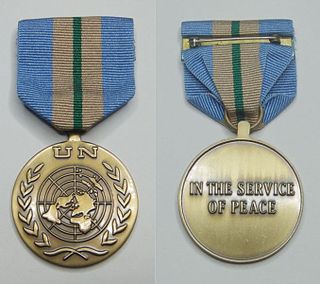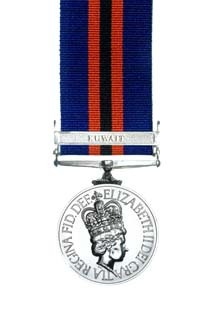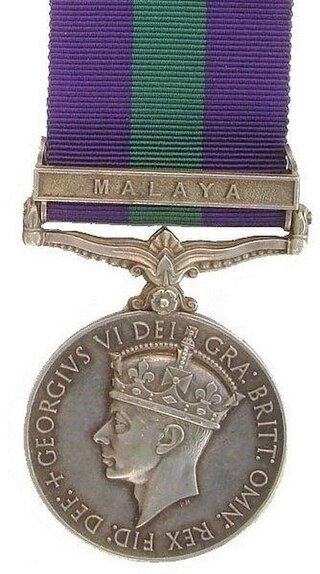The National Defense Service Medal (NDSM) is a service award of the United States Armed Forces established by President Dwight D. Eisenhower in 1953. It was awarded to every member of the U.S. Armed Forces who served during any one of four specified periods of armed conflict or national emergency from June 27, 1950 through December 31, 2022. Combat or "in theater" service is not a requirement for the award.

A service star is a miniature bronze or silver five-pointed star 3⁄16 inch (4.8 mm) in diameter that is authorized to be worn by members of the eight uniformed services of the United States on medals and ribbons to denote an additional award or service period. The service star may also be referred to as a campaign star or battle star depending on which award the star is authorized for and the manner in which the device is used for the award.
The Armed Forces Expeditionary Medal (AFEM) is a military award of the United States Armed Forces, which was first created in 1961 by Executive Order of President John Kennedy. The medal is awarded to members of the U.S. Armed Forces who, after July 1, 1958, participated in U.S. military operations, U.S. operations in direct support of the United Nations, or U.S. operations of assistance for friendly foreign nations.
The American Defense Service Medal was a military award of the United States Armed Forces, established by Executive Order 8808, by President Franklin D. Roosevelt, on June 28, 1941. The medal was intended to recognize those military service members who had served on active duty between September 8, 1939, and December 7, 1941.

The Afghanistan Campaign Medal (ACM) is a military award of the United States Armed Forces which was created by Executive Order 13363 of President George W. Bush on November 29, 2004, and became available for general distribution in June 2005. The medal was designed by the U.S. Army Institute of Heraldry.

The Iraq Campaign Medal (ICM) is a military award of the United States Armed Forces which was created by Executive Order 13363 of U.S. President George W. Bush on 29 November 2004, and became available for general distribution in June 2005. The medal was designed by the U.S. Army Institute of Heraldry and was awarded during the Iraq War, from 19 March 2003 to 31 December 2011.

The Global War on Terrorism Service Medal (GWOT-SM) is a military award of the United States Armed Forces which was created through Executive Order 13289 on 12 March 2003, by President George W. Bush. The medal recognizes those military service members who have supported operations to counter terrorism in the War on Terror from 11 September 2001, to a date yet to be determined.
The Global War on Terrorism Expeditionary Medal (GWOT-EM) is a United States Armed Forces award created by George W. Bush on 12 March 2003, through Executive Order 13289. The medal recognizes those military service members who have deployed overseas in direct service to the War on Terror from 11 September 2001 to a date to be determined. Prior to 30 April 2005, the medal was awarded for service within Iraq and Afghanistan, but has been replaced with the Iraq Campaign Medal and Afghanistan Campaign Medal and serves primarily as recognition for personnel who have deployed in support of the War on Terror to locations beyond Iraq and Afghanistan. In a similar fashion the Inherent Resolve Campaign Medal is issued for service in the fight against ISIS, with eligibility retroactive to 15 June 2014.
The American Campaign Medal is a military award of the United States Armed Forces which was first created on November 6, 1942, by Executive Order 9265 issued by President Franklin D. Roosevelt. The medal was intended to recognize those military members who had performed military service in the American Theater of Operations during World War II. A similar medal, known as the American Defense Service Medal was awarded for active duty service before the United States' entry into World War II.

A United Nations Medal is an international decoration awarded by the United Nations (UN) to the various world countries members for participation in joint international military and police operations such as peacekeeping, humanitarian efforts, and disaster relief. The medal is ranked in militaries and police forces as a service medal. The United Nations awarded its first medal during the Korean War (1950–1953). Since 1955, many additional United Nations medals have been created and awarded for participation in various United Nations missions and actions around the world.
The NATO Medal is an international military decoration which is awarded to various militaries of the world under the authority of the North Atlantic Treaty Organization (NATO). It is manufactured by Eekelers-Centini Intl, of Hemiksem, Belgium.

The Tshumelo Ikatelaho - General Service Medal was instituted by the President of the Republic of South Africa on 16 April 2003, and came into effect on 27 April 2003. It can be awarded to all ranks who have participated in military campaigns or operations which, while not warranting the institution of particular campaign medals, still justify the award of a medal for general service. The bilingual title of the medal is in Tshivenda and English.
Awards and decorations of the United States Army are those military awards including decorations which are issued to members of the United States Army under the authority of the Secretary of the Army. Together with military badges such awards provide an outward display of a service member's accomplishments.

The New Zealand General Service Medal 1992 (Warlike) (NZGSM 1992) is a New Zealand campaign medal, authorised in 1992, for award to New Zealanders who have served in warlike operations for which no separate New Zealand or British Commonwealth campaign medal was issued.

The General Service Medal was instituted to recognise service in minor Army and Royal Air Force operations for which no separate medal was intended. Local forces, including police, qualified for many of the clasps, as could units of the Indian Army prior to 1947.

The General Service Medal, is a campaign medal of the United Kingdom introduced in 1962 to replace both the General Service Medal (1918), as awarded to the Army and RAF, and the Naval General Service Medal (1915). The 1962 GSM was awarded until 2007, when it was replaced by the Operational Service Medal. In 2015 the General Service Medal (2008) was introduced.

The Secretary of Defense Medal for the Global War on Terrorism or Global War on Terrorism Civilian Service Medal is a medal awarded by the United States Department of Defense. It was authorized on August 9, 2007, but may be awarded for expeditionary service in a Global War on Terrorism mission in a combat zone on or after September 11, 2001, until a date to be determined.

The Samanya Seva Medal 1965 is a military service medal of the Indian Armed Forces. Established 8 May 1975, with retroactive effect to 26 January 1965, the Samanya Seva Medal is awarded for active service where no other campaign medal is awarded. Clasps are awarded with the medal designating recognized operations.
The Special Service Medal is a military service medal of the Indian Armed Forces. The Special Service Medal is awarded under active service conditions for minor operations or operations of short duration. Clasps are awarded with the medal indicating the particular operation for which it is awarded. For subsequent operations where the clasp is approved, only the Clasp denoting the particular operation is awarded. The name of the operation's location is inscribed on the clasp's bar.









